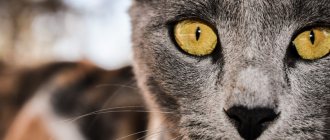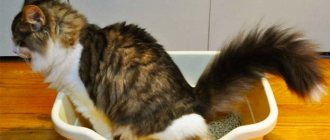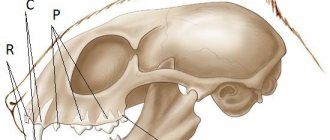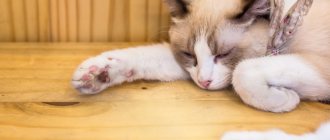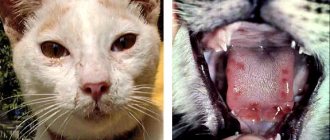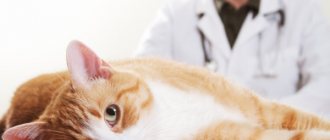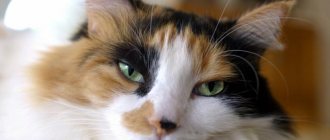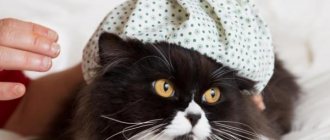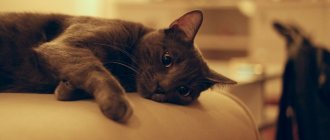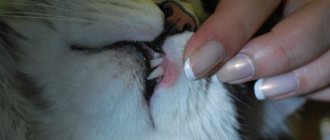Many cat owners have heard their pet make these strange, either chirping or clicking sounds, very reminiscent of grinding teeth.
This happens when a cat sees potential prey outside the window and cannot reach it, which undoubtedly serves as a sign of its disappointment or excitement from a failed hunt. This happens much less often at the sight of food. It also happens in a dream.
But what is much less harmless is if this happens while eating, because it is usually associated with some kind of pathology, and can continue permanently, unless the animal’s teeth are incorrectly positioned.
Cat clicks its jaw
If a cat grinds its teeth or clicks its jaw, this may be a symptom of traumatic injuries, infectious diseases or inflammatory processes, or helminthic infestations. Clicking is accompanied by loss of appetite, cramps, and inflammation of the gums. To identify the etiology of the squeaking, the owner must take the cat to a veterinarian, who will conduct a diagnosis and prescribe medication or surgery.
According to veterinarians, one of the reasons that causes a cat to grind his teeth in his sleep is the chronic stressful state in which the animal is.
Reasons: why does a cat chatter his jaw?
Traumatic injuries
If your cat has pain in chewing or refuses to eat at all, this may be a symptom of a jaw injury. Typically, a dislocation of the mandibular joint or a closed fracture is diagnosed if the articular ligament is stretched or torn. Bones crunch when trying to open the mouth, saliva flows, the animal cannot eat or eats reluctantly, smacks its lips while eating, and there is pronounced deformation and asymmetry of the muzzle. The cat also clicks its jaw due to a traumatic brain injury. Cause:
Infectious diseases
Tetanus (tetanus)
The causative agent is the tetanus bacillus. However, cats are resistant to the microorganism and rarely suffer from tetanus. More common in kittens or older animals due to immature or weakened immunity. Infection occurs through a puncture or cut wound with an object on which the bacteria is present. Once in the cat's body, the microbe releases a strong toxin that affects the nervous system. If a cat grinds its teeth, this is the first symptom of the disease, since at the initial stage the toxin affects the jaw muscles. Then strong convulsions of the whole body are observed, the cat gasps for air. The disease is fatal due to spasm of the heart muscles.
Osteomyelitis
The disease is characterized by bacterial inflammation of the jaw tissue - periosteum, bone body, bone marrow. A kitten can get sick when changing teeth if the wound gets infected. The cat refuses to eat and play, its temperature rises, its breathing and heart rate are disrupted, and its lymph nodes become enlarged. The disease develops due to the following factors:
Rabies
A deadly disease caused by the Rabies virus. The microorganism spreads through the nervous tissue and reaches the spinal cord and brain, causing irreversible dysfunction. The cat grinds its teeth, develops aggression and anxiety, cramps of all muscles of the body, drooling, photophobia, poor coordination of movements, panic fear of water (the animal refuses to drink). Infection occurs when a sick animal bites or licks a healthy animal.
Non-communicable diseases
Uremic gastritis
The disease occurs against the background of renal pathologies - urolithiasis, pyelonephritis, renal failure. Protein metabolism in the body is disrupted, and urea levels increase. This causes the stomach lining to become irritated as toxins accumulate in the gastric juices. With the bloodstream, urea and bile acids enter the tissues of the oral cavity, causing itching in the gums. To get rid of it, the cat clenches its jaws, and due to the effects of uric acid salts, tooth enamel is destroyed, causing the teeth to grind when the animal eats.
Worm infestation
If a cat crunches its teeth and jaw when chewing, this indicates infection with roundworms, tapeworm, hookworm, and toxocara. Worms cause abdominal pain, bloating, and nausea, which causes the pet to reflexively clench its jaw. In addition, parasites manifest themselves as intestinal upset, loss of appetite, decreased immunity, and dull coat. Routes of infection:
Infection with worms
They say that if a person grinds his teeth, then he has worms. This is not a definite, but very likely diagnosis for both people and animals. The degree of harm caused depends on the progression of the invasion, in other words, on the number of parasites living in the cat’s body.
We invite you to read: Stone hazel grouse - who is it?
Worms that parasitize the intestines can cause bruxism if the infestation is severe. The reason for teeth grinding is discomfort from a bursting feeling in the intestines and itching. Unpleasant sounds are not all the consequences of severe infestation; if a cat has not been treated for worms for more than a year, it will most likely have problems with metabolism, lack of vitamins and microelements.
There are dozens of types of parasites that are not limited to living in the intestines. Helminth eggs travel with the blood throughout the body and settle in the necessary organs: the heart, liver, lungs and brain. If a cat's brain is affected by helminths, it will experience neurological disorders, one of which is bruxism.
How is the treatment carried out?
Surgical intervention
Timely vaccination and deworming can protect your pet from dangerous diseases that cause jaw clicking.
Surgery is necessary for purulent-inflammatory process of the jaw. The cavity is opened, pus is removed, drainage is performed, and the wound is cleaned. For osteomyelitis, a sequestrotomy is performed to remove dead areas of bone, periosteum and bone marrow. In case of displaced or open fractures of the jaw, the broken fragments are fastened with metal synthesis instruments.
Drug therapy
The treatment regimen is determined by the doctor based on the etiology of the disease. Rabies is incurable because it is quickly fatal. For tetanus, antitetanus serum is administered, and anticonvulsants are recommended. Purulent-inflammatory processes are treated with antibiotics, which are prescribed by a veterinarian after identifying the pathogen. For helminthic infestations, anthelmintic drugs are effective, and vitamin-mineral complexes are effective to strengthen the body. It is also recommended to cure concomitant kidney diseases.
Source
Teeth grinding while eating
Most often, a cat grinds his teeth when he eats. At the same time, he may show concern: meow. rub its face with its paws, spit out food.
The cat creaks while eating (cat grinding his teeth) for the following reasons:
The chewing function includes several stages:
The degree of compression, the nature of the movement of the lower jaw, and the condition of the periodontal disease in their pathology cause the teeth to creak.
Subluxation of the lower jaw
When the jaw is subluxated, the cat clicks its teeth when eating or drinking. Reason: the age of the animal or an unsuccessful landing after a jump. Cats can fall and suffer severe head injuries. One of the consequences of the blow may be subluxation of the lower jaw, which leads to loose closure of the dentition. In older cats, subluxation may occur due to a strong yawn. Weakened ligaments and jaw muscles are unable to hold the jaw in the same position. Teeth grind when trying to close jaws.
A dislocated lower jaw must be corrected by a specialist. Owners of older cats have to learn this method due to frequent recurrences of subluxations. The reduction scheme consists of several manipulations:
The procedure is painful; the pet needs to have the submandibular nerves numbed.
Infection with worms
Infection with worms leads to intestinal bloating and pain, which the animal tries to drown out by intense chewing. Severe pain of any etiology causes a strong reflex clenching of the jaws, from which the teeth begin to grind. Subsequently, constipation, diarrhea, vomiting appear, and appetite decreases. The animal loses weight, its coat loses its shine, and its immunity decreases. Treatment for helminths involves destroying the parasites. Medicines are available in oral form or externally (drops for application to the skin).
Drugs should be given to the animal for prevention in any case. Cats that are not allowed outside can become infected with worm eggs brought from the street on clothes and shoes. Without following sanitary rules, the fight against helminths will be ineffective. It is necessary to wash and disinfect food and water bowls and trays. Contact with stray animals is a source of infection.
Dental pathologies
With periodontal disease, the periodontal tissues are inflamed, the neck of the tooth is exposed, and the attachment of the tooth in the gum is weakened. When eating, teeth become loose and their location changes. The surfaces of the teeth rub against each other and creak. If several teeth are severely affected by periodontal disease, they are removed under general anesthesia. To diagnose the disease, X-ray and visual examinations are performed. Teeth grind in the final stages of pathology, when bone tissue begins to deteriorate. Clenching of the jaws leads to uneven load, resulting in the cat creaking loudly while chewing.
Tartar at the junction of the gum and the base of the tooth can interfere with chewing, which is accompanied by a characteristic sound when teeth grind. The animal tries to chew on the side where there is no tartar. It is impossible to remove tartar at home: this requires an ultrasonic unit.
Diseases of internal organs
A cat grinds its teeth if the liver and kidneys cannot cope with their function. Bile acids and urates (uric acid salts) enter the oral cavity through the bloodstream. Bile breakdown products cause irritation of soft tissues. They become inflamed and begin to itch. The cat tries to fight the itching of the gums by squeezing them, causing the teeth to grind. An additional symptom of liver disease is vomiting while eating. Urea salts destroy tooth enamel. It loses its smoothness and becomes lumpy. The deformed surfaces of the teeth creak while eating.
The process of tooth decay occurs in a similar way with uremic gastritis. Its cause is chronic renal failure. The mucous membrane of the stomach becomes inflamed, resulting in increased production of hydrochloric acid. The valve between the stomach and esophagus is disrupted. Reflux occurs (reverse movement), as a result of which stomach contents enter the oral cavity, destroying the enamel.
Treatment of uremic gastritis should be aimed at renal therapy. To relieve symptoms, a low-protein diet with sufficient boiled water is recommended for the cat. Drug treatment is prescribed by a veterinarian after examining the cat’s kidneys and stomach.
Additional signs of uremic gastritis at the initial stage are:
An accurate diagnosis can be made after a biochemical blood test, ultrasound of the kidneys and stomach.
Rabies
Grinding of your cat's teeth while eating may be one of the symptoms of rabies. The chewing process becomes painful. The animal eats slowly due to difficulty moving the lower jaw. Empty chewing movements cause grinding of rubbing dental surfaces (teeth grinding). There is no cure for rabies. The only way to avoid the disease is regular vaccination. If rabies is suspected, when teeth grinding is accompanied by increasing aggressiveness or apathy, the animal is isolated for 2-3 weeks for observation.
Plaque in cats
Dental plaque gradually appears on the surface of permanent teeth and has a clinical picture in the form of a grayish or yellowish film, which is formed by a mixture of saliva, food debris and an incalculable amount of bacteria. At first, the film is completely invisible and can only be detected using special techniques. As the layer increases, the film thickens and you can see how a soft grayish plaque covers the surface of the teeth.
The occurrence of plaque is associated with several factors:
- heredity;
- type of daily feeding;
- features of the digestive system, etc.
It is extremely important to keep an eye on plaque on your teeth because over time it can mineralize and turn into a hard build-up called tartar. Timely hygiene procedures in the form of brushing with a toothbrush will help eliminate plaque and maintain the health of your beloved pet’s teeth and gums. To prevent plaque, you can use not only a brush and toothpaste, but also special chewing toys and cleansing biscuits.
Other causes of teeth grinding
Replacing baby teeth doesn't always go smoothly. In cases where the owner notices that the kitten’s teeth have begun to grind, it is necessary to look into its mouth. Permanent teeth can grow next to baby teeth. Loose baby teeth cause teeth to grind. A month after the teeth change begins, the grinding disappears. An exception is preserving the baby tooth(s) when the kitten is six months old. This tooth is removed in a veterinary clinic.
The cause of teeth grinding can be neurological disorders after anesthesia . Exceeding the dose of anesthetic, a delay in removing it from the body, features of the nervous system - all this can affect the cat’s condition. In such cases, the cat’s teeth grind, regardless of time and food intake.
When a cat’s teeth grind in a dream, it means that the animal has suffered a nervous shock. The stress experienced has a delayed reaction in the form of jaw clenching in sleep.
Source
Kitten teething
Cats have milk teeth, so if you are an inexperienced person in cat matters, do not be alarmed when you find a small cat tooth in your apartment. A kitten has a total of 26 chewing organs and their composition is as follows:
- 2 fangs;
- 6 incisors;
- 3 premolars in the upper jaw;
- 2 premolars in the lower.
We suggest you read: Scabs on the neck and head of cats
Cats do not have primary molars. Kittens begin teething at the age of 12-14 days and this process is not associated with severe pain, as it happens in humans. However, there may still be some external manifestations.
For example, there may be excessive salivation, while the kittens touch their faces with their paws and gnaw on everything that comes to hand. The first teeth to emerge are the incisors at 2-5 weeks, the next canines at 3-8 weeks, and the last to emerge are the premolars at 5 to 12 weeks. By the way, veterinary dentists do not like to call a cat’s first teeth baby teeth; they divide all chewing organs into temporary and permanent ones.
How it manifests itself
The symptom manifests itself in a cat as teeth rubbing with the characteristic sounds of grinding or squeaking.
This phenomenon often occurs:
Sometimes a cat grinds its teeth as if eating. She makes chewing movements, but there is no food in her mouth.
Teeth grinding is often associated with various diseases, and therefore may be accompanied by other symptoms depending on the pathology. Additional signs include vomiting and nausea, weakness, sleep disturbance, and loss of appetite.
In any case, this symptom cannot be ignored, because it may indicate a serious illness in the animal.
Diagnostic procedures
The diagnosis of rabies or tetanus is made by a veterinarian based on the clinical picture. Other ailments, depending on the etiology, require diagnostic methods, such as:
Additionally, the animal may undergo endoscopic examination.
- radiography;
- external examination of the structures of the oral cavity;
- Ultrasound of problem organs;
- general clinical and biochemical examination of blood and urine;
- fecal tests for helminth eggs;
- CT or MRI;
- serological tests;
- PCR;
- endoscopy.
Return to contents
What to do
The least dangerous situation is if the grinding and clicking of the tongue is associated with the appearance of tartar. In this case, professional cleaning is carried out to eliminate the cause of unpleasant symptoms and sounds. You can also improve the condition of teeth with periodontal disease.
In order to sanitize the oral cavity, clean it of bacteria and harmful microorganisms, you need to wipe the cat’s mouth with a solution of chlorhexidine and furatsilin once every six months. Metrogyl gel is also used for such purposes.
But if the sounds are caused by diseases, you need to immediately begin examination, diagnosis, and treatment. A biochemical blood test is required to show the presence of renal or liver failure or other diseases. You should not delay the process, as every day the pet’s condition worsens and the disease becomes more advanced.
The cat grinds its teeth and seems to be chewing something
Let's look at the causes of teeth grinding that do not depend on food intake.
The products of bile metabolism enter the blood and settle in the tissues. Bile acids and their salts are quite aggressive substances that lead to bitterness in the mouth and itchy gums.
The cat's teeth itch due to liver failure.
Therefore, the animal tries to “comb” its gums - you can hear the grinding of teeth.
Urea salts (urates) and unremoved nitrates circulate through the blood, and the body tries to remove their excess through the skin and mucous membranes. Your pet's fur and mouth begin to smell like urine.
Urates, accumulating on the surface of the enamel, make it dull and rough. Therefore, when rubbing with teeth and chewing, a characteristic sound is heard.
Another consequence of renal failure is uremic.
Often with this pathology, reflux occurs - a reverse flow of stomach contents into the esophagus, which can reach the oral cavity. Stomach acid in combination with urea salts has a detrimental effect on enamel, contributing to its destruction.
Chlorhexidine is a reliable antiseptic.
When creaking is associated with pathologies of the dentogingival system, sanitation of the oral cavity and the use of antiseptics will help:
- hydrogen peroxide,
- Chlorhexidine,
- Furacillin solution,
- Metrogyl gel.
If teeth grinding is associated with kidney or liver failure, you need to conduct an examination of the cat’s internal organs and take a sample. The sooner the correct diagnosis is made and appropriate treatment is prescribed, the greater the chance of saving the pet.
Causes of pathology when eating food
If a cat grinds while eating, the causes may be various diseases of the gums and teeth:
The sign also indicates a subluxation or dislocation of the pet's jaw . A cat can get injured after an unfortunate fall. In older animals, a common cause of jaw subluxation is a strong yawn.
If your kitten grinds his teeth, the cause may be tooth loss. Usually this phenomenon is observed between the ages of 4 months and six months.
The symptom develops in certain kidney and liver diseases. When these organs malfunction, uric acid salts and bile enter the oral cavity through the bloodstream.
These substances begin to irritate the mucous membranes, cause itching of the gums, and the tooth surface is destroyed. The animal begins to clang its teeth.
Rabies in a cat can also manifest itself as squeaking. This is explained by the fact that when chewing, the pet experiences severe pain.
The animal becomes aggressive, develops a fear of water and light, and foams at the mouth.
A common cause of teeth grinding when a cat eats is food that is too hard or soft.
Dental caries
Caries is a decaying process that results in the destruction of tooth enamel and the formation of a cavity. The reasons for the development of caries in cats can be a disorder of mineral metabolism, a deficiency of microelements in the body (zinc, iron, fluorine, iodine, etc.), a lack of B vitamins, as well as mechanical damage to the tooth with further infection of the wound and the entry of pathogenic microflora inside .
The disease is characterized by the presence of four stages of varying severity: spotty, superficial, medium and deep caries.
Common symptoms of tooth decay in cats include:
- darkening of tooth enamel;
- profuse drooling;
- painful sensations when chewing;
- bad breath;
- inflammatory process in the gum mucosa;
- Sooner or later, a hole appears in a damaged tooth.
Attention. The advanced stage of caries is fraught with increased signs of the disease, and in some cases the progression of more serious pathologies - pulpitis, osteomyelitis, periodontitis.
Treatment for spotty and superficial caries consists of treating the tooth with a 4% solution of sodium fluoride or silver nitrate. Since it is extremely difficult for a cat to get a filling, in other cases the doctor will most likely remove the diseased tooth using painkillers. In order to prevent caries, the owner must constantly monitor the condition of the pet’s oral cavity and visit the veterinarian on time.
Prevention
The general condition of the pet largely depends on the health of the teeth and oral cavity. Teeth do not have to hurt so that the cat cannot eat or chew food normally, without pain . Tartar, enamel damage, and periodontal disease cause discomfort and unpleasant sensations. If there is inflammation of the gums in the mouth, the pet will not be able to eat normally, it will lose weight, and its general condition will worsen.
In animals, all body systems are also closely connected, just like in humans. And teeth take an active part in food consumption, on which health and activity depend. Development of the cat's body. Therefore, every normal owner, having taken responsibility for the cat, must also monitor the condition of his mouth and teeth.
IMPORTANT! If there are deviations, modern methods of veterinary dentistry can cope with any.
Grinding can be caused by such pathologies in the development of the dental-jaw system as uneven growth of the incisors, an incomplete set of teeth, or a superset. The cat may develop an abnormal bite or improper jaw position, which also interferes with normal chewing of food and causes characteristic sounds.
Causes
Teeth cutting is called bruxism, it can be caused by psychological and physiological reasons, disturbances in the functioning of the body. Among the harmless reasons is the type of food or bird, which, although it flies far outside the window, for the cat is a goal, prey, a subject of hunting.
If cats grind their teeth only when eating, the phenomenon may not pose a danger to the health of the pet. But in any case, you need to monitor him to avoid serious problems.
ATTENTION! Unfortunately, crunching and grinding sounds can also indicate pathology in the cat’s body, so the owner needs to be careful.
The causes of grinding may be associated with serious diseases that require treatment and consultation with a veterinarian:
- A cat that clicks its tongue or grinds its teeth may have tartar . Its appearance is associated with the presence of microbes and bacteria. To get rid of the stone, the animal should be taken to a veterinary clinic, where it will have its oral cavity professionally cleaned and sanitized. You should absolutely not clean stones with sharp objects yourself.
- The cat may be suffering from gum disease. It is caused by poor oral hygiene. What can be done in this case? If a specialist discovers this cause of grinding, the owner should diversify the pet’s diet, and to prevent inflammation, the gums should be treated with antiseptics once a year. In this case, you can bring your pet to the veterinary clinic for professional teeth cleaning.
- Another reason associated with the condition of the oral cavity is periodontal disease. The animal’s teeth become loose, so during meals (and at other times), they rub against each other, causing a feeling of discomfort for the cat.
- The owner can give the pet too hard solid food , including food intended for dogs. When a cat eats it, its teeth chatter, and at this time the enamel is damaged, which leads to a deterioration in the quality and condition of the teeth.
- Why does a cat shake and grind its teeth? A dangerous reason for this behavior may be the presence of parasites and worms. They cause abdominal pain that causes the poor animal to clench its jaw.
You should definitely have your pet tested periodically, especially if there is a risk of infection. The veterinarian will select a safe and effective remedy that will get rid of parasites and restore good health . The presence of worms can be predicted not only by gnashing of teeth, but also by sudden weight loss, weakened immunity, apathy, and hair loss.
If the grinding is caused by the reasons listed above, it will most often occur while eating. But an animal can make such unpleasant sounds after eating, during sleep, or while resting. What do they indicate and how dangerous?
Causes of pathology during sleep
An animal may also grind its teeth in a dream. Usually this condition is a consequence of a stressful situation experienced. After nervous shock, a cat's jaw may clench when it sleeps.
This phenomenon in veterinary medicine is called stress bruxism.
Another reason is the pet’s recovery from anesthesia after surgery.
A cat grinds its teeth in its sleep due to helminthic infestation. If parasites in the animal’s body are activated, then these signs become more intense.
Stress
It is known that cats are impressionable, emotional creatures; they often experience stressful conditions. And one of the manifestations of this condition may be teeth grinding. A cat cannot, like a human, clench its fists when it is very tense and worried. And an animal may not experience its emotions immediately, but after a stressful situation, with a somewhat delayed reaction.
If teeth grinding is heard at night while your pet is sleeping, we can say that this is stress bruxism. During the day, the cat could become very nervous (for various reasons), and at night its condition was manifested by these sounds. New, artificially bred breeds are especially impressionable.
With psychological bruxism, it is not necessary to rush to the veterinarian; you just need to surround the animal with attention and show a little more care for it. But recommendations from a specialist can also be useful, for example, a doctor can prescribe a suitable sedative, which will not be superfluous.
Pain and discomfort
Diarrhea or other gastrointestinal disturbances may be accompanied by pain and severe discomfort. Although this condition is temporary, it can provoke attacks of bruxism. It is important to relieve pain in a timely manner, since by grinding its teeth, the cat can damage the enamel or chip part of the tooth.
By the way, any pain can provoke bruxism. A thorough examination by a veterinarian will help identify the presence of a pain reflex. Typically, in response to painful stimulation, cats squint, meow, twitch sharply, or even bite. If you understand that the cat is in pain, but do not know the reasons, it is permissible to administer half the dose of an anesthetic drug for subsequent transportation of the animal to a doctor.
Grinding of teeth, nausea or vomiting in a cat
Sometimes the grinding is accompanied by other unpleasant symptoms. If a cat is sick or vomiting, then these symptoms may indicate the presence of parasites in the pet’s body, diarrhea or constipation develops, appetite worsens, and body weight decreases.
A cat burps and grinds its teeth if it suffers from uremic gastritis or liver diseases.
The animal eats poorly and often makes chewing movements.
Additional symptoms include:
The animal vomits when kidney problems develop. Such pathologies are accompanied by frequent urination, nausea, lethargy and apathy.
Periodontitis of teeth
Periodontitis is a common disease in veterinary practice, consisting of inflammation at the apex of the tooth root. The disease often occurs in cats after two years of age and can be chronic, acute, purulent and aseptic in nature.
Inflammation can be caused by mechanical damage to the gums.
, tartar and plaque, removal of molars with disregard for antiseptic and aseptic rules, blows to the dental crown, foreign objects and particles of roughage entering the space between the tooth and gum, diseases of the gums and jaws, caries, pulpitis, etc.
Signs of periodontitis are:
- difficulty eating, lack of appetite, weight loss;
- painful sensations when touching a tooth;
- swelling of the gums in the form of a roller (with a purulent form of the disease);
- mobility of the affected tooth.
In case of periodontitis, the oral cavity is sprayed several times a day with disinfectant solutions of furatsilin, potassium permanganate or 2-5% alum solution. The gum along the ring of the affected tooth is treated with iodine-glycerin.
Attention. If the disease has turned into a purulent-diffuse form, then the tooth must be extracted and the oral cavity must be rinsed with potent antiseptics.
To prevent the occurrence of periodontitis, you should promptly remove tartar, remove plaque from your pet’s teeth, and also monitor the general condition of the mouth.
How to accurately determine the cause
To reliably determine why a cat’s teeth grind, the animal must be shown to a veterinarian.
Diagnosis begins with a visual examination by a specialist and collection of anamnesis.
Pathologies of the gums and teeth can be determined using x-ray or ultrasound.
To establish an accurate diagnosis, a blood test for biochemistry and a urine test are performed.
It is important to make an accurate diagnosis; the correct treatment and elimination of symptoms depend on this.
How to help your pet
To help your cat, you must first determine why this symptom develops. Medications in the form of tablets, drops, injections, and surgical methods can be used. In some cases, the animal is prescribed a special diet.
What to do in case of teeth grinding depends on the cause of the development of this condition:
If a cat has liver or kidney disease, experts recommend giving your pet food low in protein and plenty of fluids.
If teeth grinding is caused by rabies, the animal will die. He urgently needs to be isolated . The pet owner is prescribed a course of vaccination. Unfortunately, this disease is incurable for animals. You can avoid it by vaccinating your cat.
Gingivitis of teeth
Gingivitis is a chronic inflammation of the gum mucosa. The initial phase of the disease is characterized by the appearance of yellow plaque on the teeth, which is due to food debris stuck between the teeth. The tissue around the tooth begins to redden and bleed, and ulcers and cracks form on the gums.
Gingivitis in cats can develop for many reasons: tartar (one of the main factors), poor oral hygiene, gum injuries, vitamin deficiency, infectious diseases, pathologies of internal organs, metabolic disorders, feeding soft foods, etc.
The clinical picture of the disease is manifested by the following signs:
- foul breath;
- bleeding gums, especially when touched;
- redness and swelling of the gums, especially along the gum line;
- poor appetite.
Treatment for gingivitis depends on the severity of the disease.
. At the early stage of the disease, treatment is carried out at home with regular brushing of teeth and treatment of gums with special ointments (for example, Metrogyl Denta, Zubastik, Dentavidin). In severe cases, the veterinarian may prescribe antibiotic therapy and even hormonal medications.
To prevent the development of gingivitis, it is necessary to brush your pet’s teeth daily with a special paste and brush, accustom the animal to solid food, prevent vitamin deficiency, treat diseases in a timely manner and undergo regular examinations by a veterinarian.
Even if the only things your cat hunts for are chicken-flavored food and toy mice, she still needs clean, sharp teeth and healthy gums. Damage to the tongue, teeth, palate and gums can lead to many health problems in cats, but this can be prevented with regular home checks and a good old-fashioned toothbrush.
Here are ten steps to healthy cat teeth:
1. Breath test: “breathe, I’ll sniff.” Of course, a cat's mouth shouldn't smell like roses, but the smell shouldn't be unpleasant or disgusting. If there is an abnormally strong breath coming from your kitten's mouth, he may have problems with his digestion or gums (for example), and should be taken to the veterinarian.
2. Inspection of the lips: pull the cat's head towards you and gently move her lips away, look at the gums. The gums should be firm and pink, not white or red, and there should be no signs of swelling. The teeth should be clean and free of brownish tartar, and there should be no broken or missing teeth.
3. Closer Look: Check for the following signs that could indicate dental health problems in your cat:
- Dark red lines along the gums;
- Red and swollen gums;
- Sores on the gums or tongue;
- Lost teeth;
- Pus;
- Difficulty chewing food;
- Strong;
- The cat scratches and scratches the mouth area vigorously.
4. Dangerous swelling: If you notice any signs of gum inflammation, be sure to take your cat to the vet for a checkup. If gum disease is left untreated, it can lead to tooth loss and eating difficulties. Gum inflammation can also indicate internal problems such as or.
5. The Lowdown on Tooth Decay: Bacteria and plaque-forming foods can accumulate on your cat's teeth. They can harden and turn into tartar. Tartar can cause gum inflammation and tooth loss. Solution? Of course, this means regular brushing of your teeth.
6. Brushing your cat's teeth: All you need to clean your cat's teeth are cotton swabs, a small toothbrush, and a tube of toothpaste designed specifically for cats (available at any pet store). You can also use salt and water. Never use toothpaste intended for humans, as the ingredients may be harmful and even poisonous to your cat!
7. Sparkling and Pearly Whites: Clean your cat's teeth at home by following these simple steps:
- Your cat needs to get used to the toothbrush first. Start by gently massaging her gums with your fingers and touching them with cotton balls.
- After a few sessions, place some cat toothpaste on her lips so she can taste the paste.
- Next, try using a toothbrush designed specifically for cats that is smaller than human toothbrushes and has soft bristles. There are also toothbrushes on sale that you can put on your finger, which also allow you to give your cat's gums a good massage.
- Finally, apply toothpaste to your teeth for a gentle brushing.
- It's a good idea to take your cat to the vet for a check-up in advance to find out if your cat has gum disease. Many cats have mild gingivitis, and brushing their teeth and gums too hard can harm them.
8. Chew Toys: Chew toys will help satisfy your cat's natural urge to chew, making her teeth stronger. Chew toys can also help your cat clean his teeth, massage his gums, and gently scrape away tartar.
9. Diet for healthy teeth: If your cat has dental problems, contact your veterinarian to recommend a special food that will help keep your cat's teeth healthy and remove plaque.
10. Knowledge of Oral Diseases: If your cat is suffering from any of the following symptoms, contact your veterinarian immediately:
- : This is an inflammation of the gums that occurs mainly in older cats. It may start as a dark red line bordering the teeth. If the condition is not treated, the gums may become inflamed and ulcerate. This condition may be a sign of feline immunodeficiency virus or another infection.
- Periodontitis: If gingivitis affects the socket of a tooth, the tooth may fall out and an abscess may form in its place.
- : This is an inflammation of the mucous membrane of the mouth. May be the result of a foreign body in the mouth, a viral disease, or dental problems. In this case, the cat experiences difficulty feeding, and the oral mucosa becomes red.
- Ulcer: A slowly expanding sore, wound, ulcer, or swelling on the upper lip.
- Salivary cyst: If the salivary glands or ducts that carry saliva into the mouth are blocked, cysts can form under the tongue.
- Mouth ulcers: Ulcers on a cat's tongue and gums are sometimes caused by respiratory or kidney problems.
